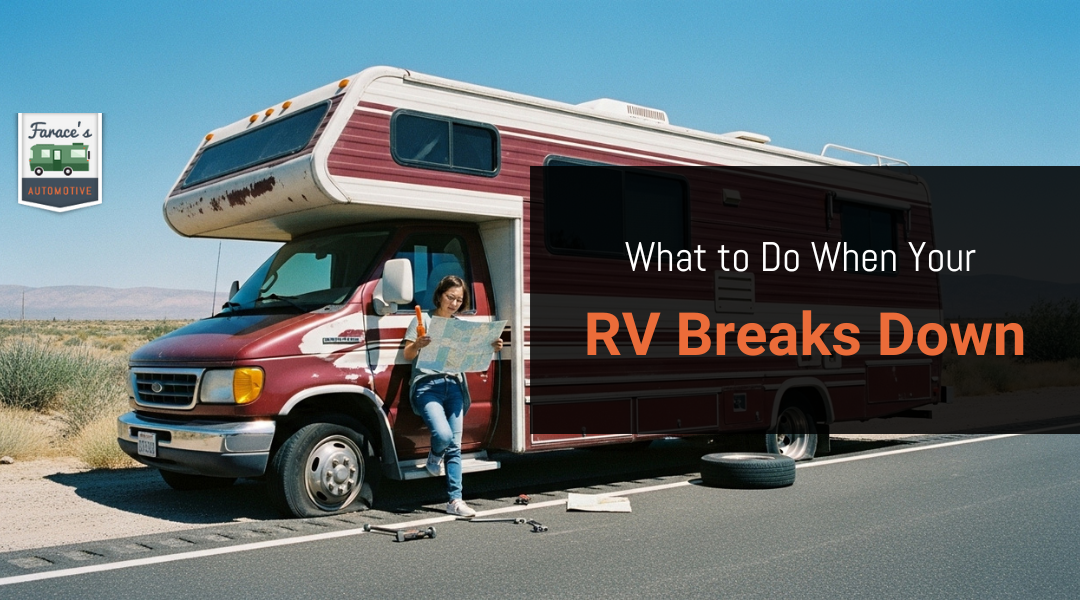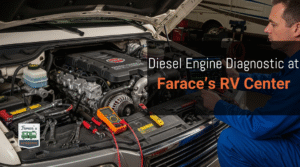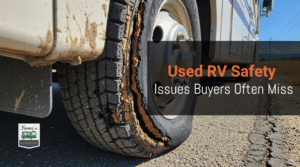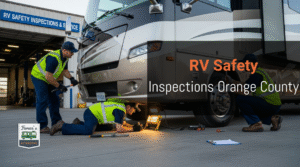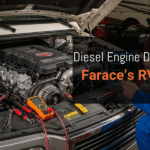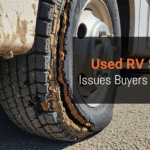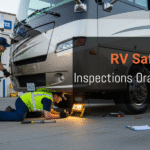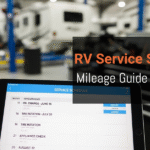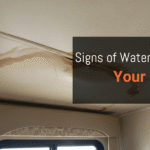When an RV breaks down on the road, especially in Southern California, it can be a stressful and potentially dangerous situation. The most important step is to stay calm, assess the problem safely, and contact a trusted repair service like Farace Automotive & R.V. Center to get expert assistance quickly. Knowing who to call and understanding the basics of roadside safety can prevent small issues from turning into costly disasters.
Farace Automotive & R.V. Center in Huntington Beach offers specialized RV repair and roadside support with over 40 years of experience. Their technicians handle everything from mechanical repairs to collision restoration and generator servicing, making them a reliable partner when unexpected breakdowns occur. Being prepared with key contacts and understanding available services is crucial for any RV traveler in the region.
Stay Calm And Assess The Situation
When an RV breaks down on the road, quick, clear thinking is essential. Recognizing the safest course of action helps prevent further danger and sets the stage for effective assistance.
Ensure Personal And Passenger Safety First
The priority is getting everyone out of harm’s way immediately. The driver should ask all passengers to exit the vehicle cautiously, preferably on the side away from traffic.
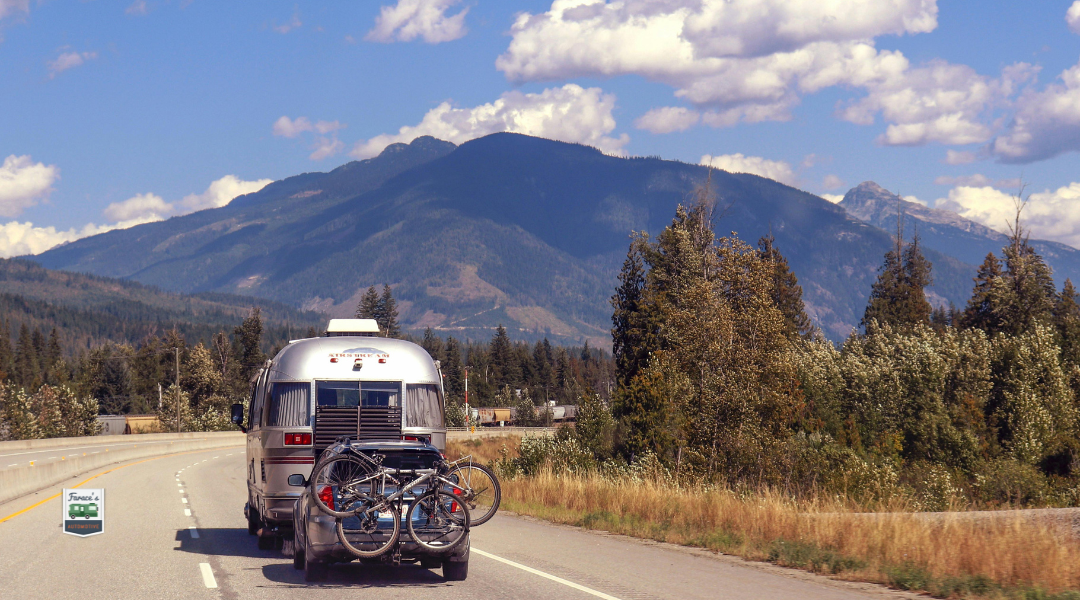
Check for any injuries before moving anyone. If someone is hurt, call emergency services right away and avoid moving the injured unless absolutely necessary to avoid further harm.
Stay alert to the environment, watching for passing vehicles or hazards like fire or leaking fuel. Remaining calm and focused reduces the risk of panic and slips in judgment.
Move To A Safe Location (If Possible)
If the RV is still operable, carefully steer it to the shoulder, a rest area, or another safe zone off the main lanes. Avoid stopping on curves, narrow shoulders, or near blind spots.
If the vehicle is immobile, turn on hazard lights immediately. Passengers should gather well away from the RV and traffic, behind guardrails or a safe barrier if available.
Using landmarks or cellphone GPS can help when reporting your exact location to roadside assistance or emergency responders.
Turn On Hazard Lights And Use Safety Equipment
Hazard lights signal other drivers and are essential immediately after a breakdown. They help alert approaching vehicles to slow down and take caution.
Set up reflective triangles or road flares around the RV if available. Place them at increasing distances behind the vehicle—typically 10, 100, and 200 feet—to maximize visibility.
Wearing a reflective safety vest when outside the RV enhances visibility, especially at night or in poor weather conditions. Safety tools reduce the chance of secondary accidents while waiting for help.
Diagnose Common RV Breakdown Issues On The Spot
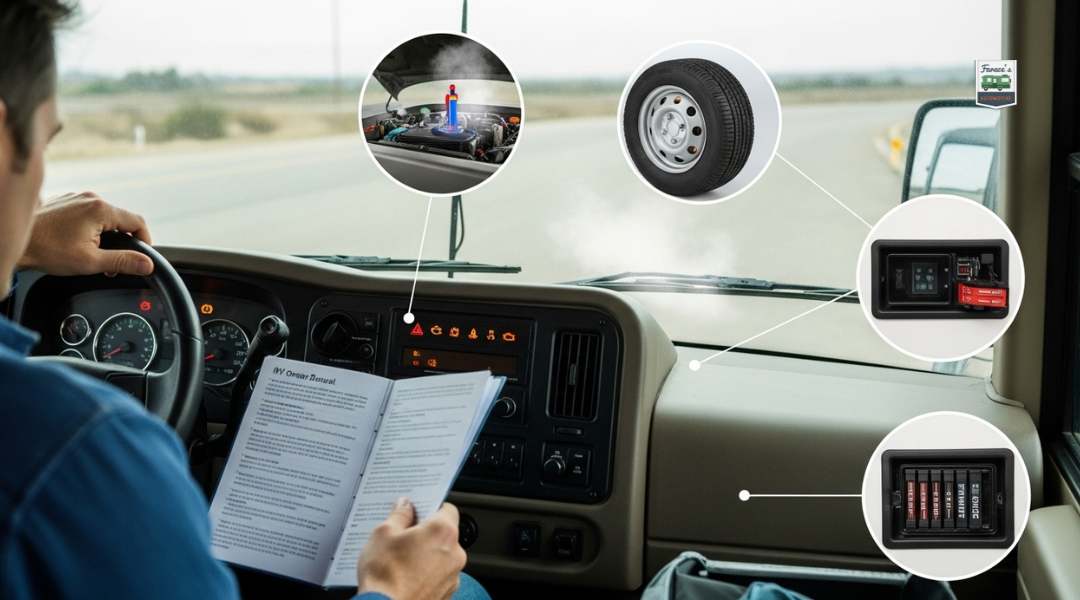
When an RV breaks down, identifying the cause quickly can help prevent further damage and ensure safety. Common issues involve the engine, electrical system, tires, and brakes. Recognizing symptoms early and performing basic checks allows travelers to decide when immediate repair or roadside assistance is necessary.
Overheating Engine (Especially In Desert Or Summer Travel)
High temperatures put extra strain on an RV’s cooling system. Drivers should first check the coolant level once the engine has cooled. Low coolant or leaks around hoses can cause overheating.
If the temperature gauge rises beyond normal, pull over safely and turn off the engine. Inspect the radiator and coolant reservoir for proper fluid. Avoid opening the radiator cap while hot to prevent burns.
Check the fan operation and belts for wear or damage. Overheating may also stem from blocked airflow due to debris on the radiator. Clearing any obstructions and topping off fluids can sometimes stabilize the temperature enough to reach a repair shop.
Battery Failure Or Electrical Malfunction
Battery problems often show as slow or no engine start and dim interior lights. Drivers should check battery terminals for corrosion or loose connections.
A multimeter can verify proper voltage; a healthy 12-volt battery should read about 12.6 volts when the engine is off and 13.7 to 14.7 volts when running. If the voltage is low, jump-starting or using portable power can provide temporary relief.
Electrical malfunctions can include blown fuses or failed alternators. Inspect fuse boxes for tripped fuses and replace those that are faulty. If the issue persists, professional electrical diagnostics are necessary.
Tire Blowouts On Freeways
A sudden tire blowout causes a rapid loss of control and demands immediate, calm action. The driver should firmly grip the steering wheel and avoid sudden braking.
Slow the RV gradually by easing off the accelerator and carefully steer toward the shoulder or a safe pull-off area. Once stopped, turn on hazard lights and use cones or triangles if available.
Inspect the damaged tire for severity. A flat or shredded tire must be replaced with the spare. It is critical to ensure the spare is properly inflated and the jack and tools are in good condition before changing the tire by the roadside.
Brake Issues Or Warning Light Alerts
Brake problems manifest as reduced braking efficiency, unusual noises, or dashboard warning lights. Drivers should respond immediately to any brake warning by stopping safely and inspecting brake fluid levels.
A low brake fluid reservoir may indicate a leak or worn brake pads. If pads are worn thin, they need replacement before continuing.
Listen for squeaking, grinding, or vibration during braking, which signals mechanical issues. Warning lights require checking the vehicle manual for specifics but generally indicate urgent attention. Continued driving without functional brakes is unsafe.
What Not To Do During An RV Emergency
During an RV breakdown, there are critical mistakes to avoid that could worsen the situation or create safety hazards. Staying calm and making wise decisions ensures a safer response to the emergency.
Don’t Attempt Complex Repairs Yourself On The Roadside
He should never try to fix major mechanical or electrical issues on the roadside. RV systems are complex, and without proper tools and expertise, attempting repairs can cause further damage or lead to injury.
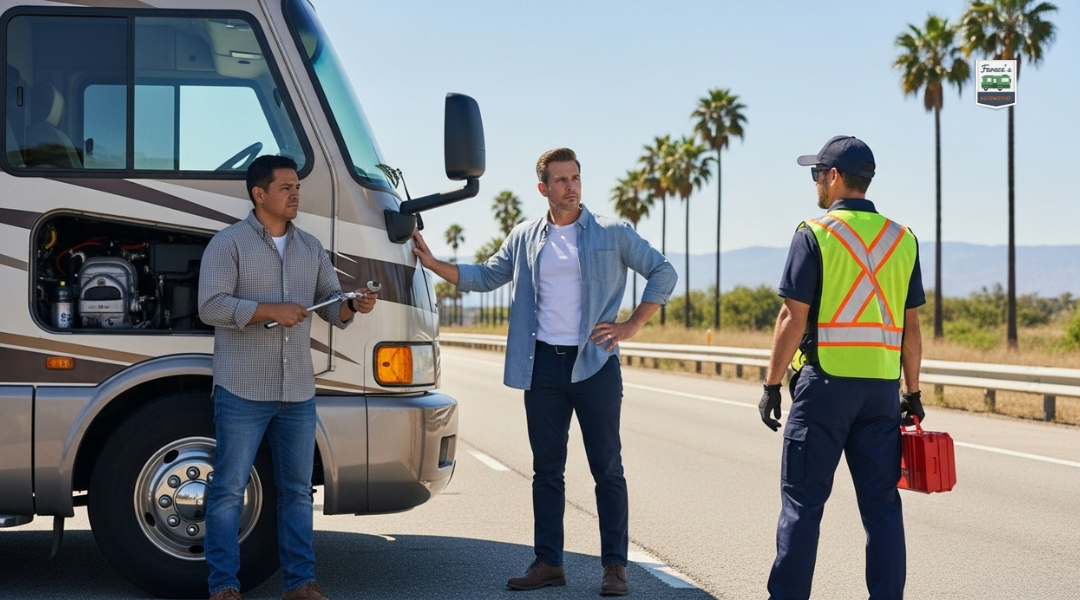
Simple checks like refilling fluids or resetting breakers are acceptable, but anything beyond that should be left to professionals. Farace Automotive & R.V. Center recommends calling for expert roadside assistance or towing. This reduces the risk of costly, unsafe mistakes and speeds up getting back on the road.
Avoid Blocking Traffic Or Staying Too Close To The Vehicle
He must avoid parking his RV where it blocks lanes or narrows traffic flow. This puts both the driver and other road users at risk. Finding a safe spot off the road, like a shoulder or designated emergency area, is essential.
Staying too close to the RV during a breakdown is dangerous, especially on busy highways. Other drivers might not see people standing nearby, which increases accident potential. Maintaining distance and using hazard lights ensures safer conditions until help arrives.
Contact Emergency Or Roadside RV Services In SoCal
When an RV breaks down in Southern California, knowing the right assistance to call can prevent further damage and ensure safety. Whether the situation is an emergency or requires roadside towing or repairs, identifying the right service quickly is essential. Professional roadside companies offer different levels of support depending on the issue.
When To Call 911 Vs Roadside Assistance
Call 911 immediately if there is an accident involving injuries, fire, or if the RV is creating a hazardous situation on a busy road. Emergencies requiring police, fire, or medical intervention fall under this category.
For mechanical breakdowns, flat tires, or minor issues, contacting roadside assistance is the better choice. Roadside services specialize in towing, tire changes, battery boost, and minor repairs. This avoids overloading emergency responders and ensures the problem is handled by experts equipped for vehicle issues.
Recommended RV Roadside Services In Southern California
RV owners in SoCal should prioritize services offering 24/7 availability and expertise with large vehicles. Reliable services provide:
- Tire repair/replacement
- Battery jump-start
- Fuel delivery
- Winching and extraction
- On-the-spot mechanical repairs
Companies like NAC Road Service and FYX specialize in commercial and recreational vehicles. It is beneficial to choose a provider with a live call center that offers immediate dispatch and understands RV-specific needs.
How Farace Automotive & R.V. Center Supports Stranded RV Owners
Farace Automotive & R.V. Center offers dedicated roadside assistance tailored to RVs in Huntington Beach and nearby areas. They provide prompt mechanical support, towing, and repair services specialized for large vehicles.
Their technicians understand the complexity of RV systems, from engines to electrical and plumbing. Farace combines mobile repair options with a full-service repair center, reducing downtime for stranded RV owners while ensuring comprehensive care.
Short-Term Fixes You Can Try Safely
When an RV breaks down on the road, some quick actions can keep the situation manageable until professional help arrives. Basic electrical resets, temporary repairs for leaks, and emergency kits can address common issues without special tools or expertise.
How To Reset Basic Electrical Systems
If the RV experiences electrical issues, the first step is to reset the main circuit breakers or fuses. These are usually located near the RV’s electrical panel. Turning breakers off and on can restore power to stalled components.
For 12-volt systems, check the battery disconnect switch. Turning it off for about 30 seconds then back on can reset onboard electronics. Inspect visible wiring for loose connections or corrosion before attempting a reset.
Avoid trying resets if you see sparks or smell burning. If issues persist, it’s safer to wait for professional diagnostics to prevent further damage.
Temporary Fixes For Leaks Or Battery Drain
Small water leaks can be temporarily sealed using waterproof tape or plastic sheeting secured with strong adhesive or clamps. Focus on shutting off water supply valves near the leak to minimize damage.
For battery drain, turn off all non-essential electronics and lights. Disconnect auxiliary batteries if necessary to preserve charge for critical systems.
Keep emergency water containers handy and avoid electrical use near leaks. This reduces risk of shock or further water damage until repair is possible.
When To Use Sealants Or Emergency Repair Kits
Use RV-specific sealants sparingly on minor cracks or leaks in plumbing and exterior seals. Clean and dry the affected area first to ensure proper adhesion. Avoid applying sealants on large gaps or where structural integrity is compromised.
Emergency repair kits, typically including patch materials and adhesives, can buy time but are temporary fixes. Only apply these while parked safely off the road and monitor the repair closely for signs of failure.
If a repair requires tools or skills beyond basic patching, seek professional service promptly to prevent escalating damage.
Prepare For The Tow Or Repair Process
When an RV breaks down, understanding how to manage towing and repair efficiently can prevent further damage and reduce stress. Clear communication with repair shops and knowing the importance of specialized RV services are essential steps.
What To Know About Towing An RV In California
Towing an RV in California requires using equipment designed for heavy, large vehicles to avoid damage. Flatbed towing is often preferred to protect the RV’s suspension and chassis.
California law mandates secure towing connections and proper lighting to ensure safety on highways. It is critical to notify the tow operator about the RV’s size, weight, and any slide-outs or appendages.
If possible, drivers should remove personal belongings from the RV before towing to reduce weight. Confirm that the towing company is licensed for handling recreational vehicles specifically.
How To Communicate With Repair Shops Remotely
Accurate information about the RV’s symptoms can speed up diagnosis when speaking with repair shops remotely. Descriptions should include sounds, smells, dashboard warnings, and when problems occur.
Send clear photos or videos of the issue if possible. This visual aid helps mechanics assess the situation before arrival or gives estimates remotely.
Be ready to provide the RV make, model, year, and any recent maintenance history. Request clear timelines for repair and ask about parts availability upfront.
Use direct contact methods like phone calls or official apps to ensure reliable communication and avoid delays.
Why RV-Specific Shops Like Farace Matter For Safe Recovery
RV-specific shops like Farace Automotive & R.V. Center have technicians trained in the unique systems of recreational vehicles. They understand specialized components like gas systems, plumbing, and slide mechanisms.
General repair shops may not have the right tools or experience, which risks causing additional damage during diagnosis or repair.
Farace’s location in Huntington Beach allows faster response times and better knowledge of local towing regulations. Their tailored services ensure safe recovery and efficient repair, protecting the owner’s investment and safety.
Preventing Breakdowns Before They Happen
Maintaining an RV in good condition requires planning and consistent effort. Proper care before hitting the road reduces risks and prepares the vehicle for Southern California’s unique driving conditions and climate.
Schedule Regular Inspections Before Long Trips
Regular inspections should cover essential systems like brakes, tires, engine fluids, and electrical connections. Checking tire pressure and tread depth is critical, especially with the frequent hill climbs and highway speeds common in SoCal.
Farace Automotive & R.V. Center recommends a full diagnostic look at belts, hoses, and the cooling system to avoid overheating. An inspection at least two weeks before a trip gives time to address any issues, preventing costly roadside failures.
Visual checks of lights and signals ensure visibility and legal compliance. Make a checklist that includes fluid levels, battery health, and brake performance as part of routine maintenance.
Must-Have Emergency Gear For SoCal RV Travel
Carrying the correct emergency gear minimizes risks when a breakdown does occur. Key items include a jack rated for RV weight, spare fuses, and a portable air compressor.
An emergency roadside kit should also have reflective triangles, a flashlight with extra batteries, and gloves. Bring extra engine oil, coolant, and fuel additives suitable for gas or diesel engines.
Communication tools such as a charged cell phone with backup power banks help maintain contact during an emergency. Farace Automotive & R.V. Center advises travelers always pack a basic toolset adapted for RV-specific repairs.
Seasonal Prep: Heat, Hills, And Highway Driving Tips
Southern California’s heat requires checking coolant levels and the radiator system more frequently. Heat can strain tires, so inspecting for sidewall cracks or wear before long drives is essential.
Hill driving demands a working transmission and brake system capable of handling incline stress. Drivers should be familiar with using engine braking to avoid overheating brakes on downhill stretches.
Highway speeds expose the RV to wind and road vibration. Ensuring wheel lug nuts are tightened and sway control devices are functional increases safety and prevents mechanical issues. Regularly test the suspension system, especially after rough road segments.
Why Farace Automotive & R.V. Center Is Your Best Partner In Emergencies
Farace Automotive & R.V. Center provides timely assistance and expert repairs tailored to RV owners in Southern California. Their team brings specialized skills and a strong local presence to handle roadside emergencies with efficiency and precision.
Quick Response Times In The Huntington Beach Region
Located in Huntington Beach, Farace Automotive & R.V. Center benefits from proximity to major Southern California highways. This allows them to offer rapid response when an RV breaks down, minimizing your wait time.
They prioritize immediate assessment and quick mobilization of their technicians. Their local knowledge helps them navigate traffic and reach customers fast, crucial when stranded on busy roads or in unfamiliar areas.
Additionally, their service includes on-site repairs when possible, avoiding the need to tow your vehicle. This flexibility is valuable in preventing extended delays during urgent breakdowns.
Certified Diesel, RV, And Trailer Repair Professionals
The technicians at Farace Automotive & R.V. Center are certified specialists in diesel engines, RV systems, and trailer maintenance. This expertise ensures precise diagnosis and reliable repairs across all vehicle components.
They handle everything from engine troubles to electrical issues and collision damage. Their capabilities cover both gas and diesel-powered RVs, as well as trailers and tow vehicles.
The center also emphasizes ongoing training to keep pace with evolving technologies in recreational vehicles. Customers benefit from experienced professionals who understand the complexity of modern RV systems and provide quality workmanship.

